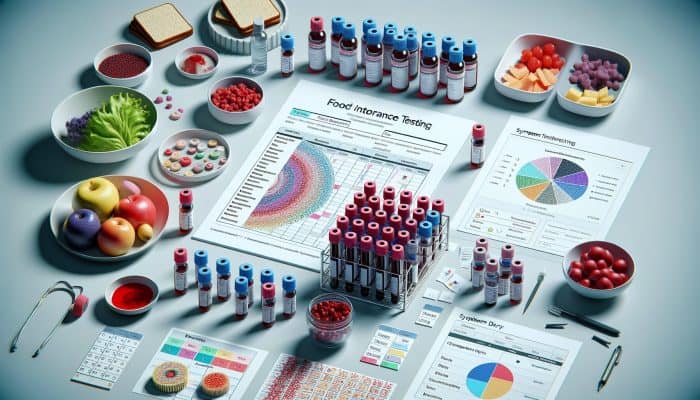Deepen Your Understanding of Food Intolerance Testing
Unpacking the Mechanisms of Food Intolerance Testing

Food Intolerance Test in Heywood: The significance of a food intolerance test lies in its ability to identify specific foods that may trigger adverse reactions in individuals. By identifying these problematic foods, people can make informed dietary changes, leading to enhanced health and comfort. The testing process typically encompasses various evaluations, including blood tests, dietary assessments, and meticulous symptom tracking. The symptoms associated with food intolerance can vary widely but commonly include:
- bloating
- gas
- abdominal pain
- diarrhoea
- constipation
- headaches
- fatigue
- skin rashes
Gaining insights into how these symptoms relate to dietary habits can be incredibly beneficial for individuals aiming to improve their overall well-being and quality of life.
Exploring the Varied Types of Food Intolerance Testing Methods
Food intolerance testing encompasses various methodologies, each presenting distinct advantages and considerations. Among the most prevalent are blood tests, which measure specific antibodies in the bloodstream that may suggest an intolerance. Elimination diets involve the temporary removal of suspected trigger foods from one’s diet, followed by a gradual reintroduction phase to monitor for reactions. Additionally, breath tests assess hydrogen or methane levels in the breath after consuming particular sugars, aiding in identifying intolerances such as lactose and fructose intolerance.
Each method has its unique strengths; for instance, blood tests generally provide quicker results, while elimination diets may offer a more comprehensive view of how different foods affect an individual's health. However, elimination diets require discipline and diligent monitoring. It is vital for individuals to consult healthcare professionals to ascertain which testing method aligns best with their symptoms and lifestyle.
Realising the Significant Advantages of Food Intolerance Testing
The advantages of undergoing a food intolerance test are substantial, often resulting in transformative lifestyle improvements. Primarily, identifying intolerances can relieve uncomfortable symptoms, significantly enhancing daily living experiences. Additionally, personalised dietary modifications can enhance nutrient absorption and support overall wellness. Key benefits of food intolerance testing comprise:
- enhanced digestive health
- increased energy levels
- improved mental clarity
- better skin health
- reduced inflammation
- a more personalised diet
By understanding which foods to avoid, individuals can foster a healthier relationship with food, thereby alleviating anxiety during mealtimes and promoting overall well-being.
Identifying Who Should Consider Food Intolerance Testing

Individuals facing unexplained digestive issues, persistent skin conditions, or chronic fatigue may significantly benefit from undergoing a food intolerance test. Symptoms such as bloating or fatigue can lead to frustration and confusion, complicating the process of identifying underlying causes. For example, a person who consistently feels fatigued after meals might discover an intolerance to gluten or dairy, potentially contributing to their energy fluctuations.
Furthermore, individuals diagnosed with conditions like irritable bowel syndrome (IBS), fibromyalgia, or skin disorders such as eczema and psoriasis should consider these tests to uncover dietary triggers. Essentially, anyone aiming to improve their quality of life through effective dietary management should explore the possibility of a food intolerance test.
Evaluating the Limitations and Key Considerations of Food Intolerance Tests
While food intolerance tests provide valuable insights, they also come with certain limitations. The results often require further interpretation and discussion with healthcare professionals to ensure accurate dietary adjustments. Additionally, the tests can sometimes yield false positives or negatives, which may lead to unnecessary dietary restrictions or overlooked intolerances. It is essential to recognise that food intolerances can intersect with other health issues, highlighting the need for comprehensive assessments.
Moreover, some individuals may encounter emotional challenges while adapting to dietary changes. This aspect underscores the importance of approaching food intolerance testing within a supportive environment, often involving professional guidance and community support.
Finding Food Intolerance Testing Services in Heywood
Locating Local Clinics Offering Food Intolerance Testing

Heywood boasts several reputable clinics that offer food intolerance testing, catering to the community's growing awareness of dietary health. Notable clinics include:
- Heywood Health Centre
- Rochdale Infirmary
- PureHealth Clinic
- Health Matters Clinic
These facilities provide a range of testing options and professional consultations to help individuals understand their nutritional needs. Each clinic emphasises the importance of customised dietary assessments, ensuring participants receive thorough care and support.
Understanding the Costs Associated with Food Intolerance Tests
The pricing of food intolerance tests in Heywood can vary considerably based on the testing method and provider. Typically, individuals can expect to pay between £50 and £200, depending on the complexity of the chosen tests. For instance, basic blood tests may fall on the lower end of the pricing spectrum, while comprehensive testing packages that include consultations and follow-up may incur higher costs.
It is advisable to contact individual clinics for their specific pricing structures and to inquire about any available payment plans or discounts for multiple tests. Gaining insight into potential costs in advance can assist individuals in budgeting effectively and selecting the most suitable options for their needs.
What to Expect During Your Food Intolerance Testing Process
The process of undergoing a food intolerance test is typically straightforward and non-invasive. Depending on the selected method, individuals may encounter various procedures. If you opt for a blood test, anticipate a quick blood draw, which usually takes only a few minutes.
In the case of elimination diets, you will need to adhere to specific dietary guidelines, which may take more time but can ultimately yield rewarding insights. Breath tests, which involve consuming a sugar solution and subsequently providing breath samples over a designated timeframe, are also quite simple. Regardless of the chosen method, healthcare providers will guide you through each step to ensure a comfortable experience.
Expert Perspectives on Food Intolerance Testing in Heywood
Transforming Your Quality of Life Through Food Intolerance Testing
Food intolerance tests have the potential to dramatically improve your quality of life by identifying specific foods that may lead to unpleasant symptoms. For instance, many individuals report significant relief from digestive discomfort after eliminating identified trigger foods. Consider a local Heywood resident who struggled with chronic bloating and fatigue. Following a food intolerance test, she discovered intolerances to gluten and dairy. By adjusting her diet accordingly, she experienced a remarkable boost in her energy levels and overall well-being.
These tests empower individuals to reclaim their lives from frustrating symptoms that often hinder their daily activities. The psychological benefits should not be underestimated; recognising the underlying causes of discomfort fosters a sense of empowerment and proactive health management.
Insights from Experts Regarding Food Intolerance Testing
Nutritional and gastroenterological experts frequently endorse food intolerance testing as a valuable resource for individuals facing unexplained symptoms. They highlight the importance of a comprehensive approach that integrates dietary evaluations, lifestyle assessments, and, in some cases, psychological support.
To maximise the effectiveness of test results, individuals should collaborate closely with healthcare professionals to create a personalised action plan. This plan may involve strategies for reintroducing new foods into the diet following an elimination phase or tips for navigating social situations with limited food choices. By emphasising an evidence-based approach to diet, individuals can make informed decisions that significantly enhance their health outcomes.
Are There Risks Associated with Food Intolerance Testing?
While food intolerance tests are generally considered safe, certain methods may carry minimal risks. For example, blood tests might lead to minor bruising or discomfort at the injection site. Elimination diets require careful planning and can result in nutrient deficiencies if not managed appropriately.
However, with proper guidance from healthcare professionals, these risks can be effectively mitigated. It is essential for individuals to communicate openly with their healthcare providers about any concerns and to seek advice on maintaining a balanced diet throughout the testing process.
Preparing for Your Food Intolerance Test: Essential Steps
What Preparations Are Important Before Your Test?
Preparation for a food intolerance test may vary depending on the type of test you are undergoing. Nonetheless, there are general steps you can take to ensure accurate results. Before your test, consider the following preparation tips:
- Avoid specific foods known to provoke reactions for several days prior to testing.
- Consult with your healthcare provider regarding any fasting requirements.
- Inform your provider about any medications or supplements you are currently taking.
- Maintain a food diary leading up to the test to document symptoms associated with your diet.
These steps are crucial in ensuring that the test results are both reliable and reflective of your true dietary intolerances.
What Is the Typical Duration of the Testing Process?
The time required for a food intolerance test can vary greatly depending on the method employed. For a blood test, the actual procedure may take just a few minutes, while the results might take several days to process. Conversely, if you opt for an elimination diet, the testing process may extend over several weeks or even months, depending on how rigorously you adhere to dietary restrictions and the pace at which you reintroduce foods.
Ultimately, the timeline will depend on your individual approach and your provider's protocols. Exercising patience and commitment to the process can lead to a more accurate understanding of your food intolerances.
Can You Resume Your Normal Diet After the Test?
After completing a food intolerance test, most individuals can return to their normal diet. However, adhering to any specific instructions provided by your healthcare provider is crucial. For instance, if you underwent an elimination diet, your provider may suggest a structured plan for reintroducing foods and observing any reactions.
Paying attention to your body and noting any changes following the test can yield valuable insights into your dietary choices moving forward. By staying aware of your symptoms, you will be better equipped to manage your food intolerances effectively.
What Varied Types of Food Intolerance Tests Are Available?
There are several methods for testing food intolerances, each with unique approaches and varying levels of accuracy. Elimination diets involve systematically removing potential trigger foods for an extended period, followed by gradual reintroduction to identify reactions.
Blood tests measure specific antibodies that indicate intolerances, while breath tests assess digestive responses to certain sugars. Each method has its strengths, so the choice of test should be based on your symptoms and health objectives. For optimal results, consulting a healthcare professional about the most suitable testing method is highly recommended.
Where Can You Access Food Intolerance Testing Services?
Food intolerance tests can be conducted in various settings, including hospitals, specialised clinics, and even through home testing kits available online or in pharmacies. In Heywood, local clinics such as the Heywood Health Centre and PureHealth Clinic provide comprehensive testing services, often accompanied by professional consultations to guide individuals through their results.
While home testing kits offer convenience, they may lack the personalised support and interpretive guidance provided by healthcare professionals. For more accurate and reliable outcomes, visiting a healthcare facility is advisable.
Deciphering Your Food Intolerance Test Results: Key Insights
How Are Food Intolerance Test Results Presented?
Results from food intolerance tests are typically compiled in a detailed report that outlines the specific foods to which you may be intolerant. The report often categorises levels of intolerance from mild to severe, providing a clear understanding of which foods to avoid.
Additionally, many testing facilities include recommendations for dietary adjustments based on the results. Understanding the nuances of your test results empowers you to take actionable steps towards enhancing your health and preventing discomfort. Engaging in discussions with healthcare professionals can further clarify any uncertainties surrounding your results.
What Dietary Implications Arise from the Test Results?
Properly interpreting your food intolerance test results is crucial for making informed dietary decisions. If your report indicates intolerances, it may be necessary to eliminate those foods from your regular diet to prevent adverse reactions. This not only alleviates symptoms but also enhances overall health and well-being.
For instance, if lactose intolerance is identified, opting for lactose-free alternatives can significantly enhance digestive comfort. Collaborating with a nutritionist can further assist you in restructuring your diet to ensure it remains balanced and nutritious despite the necessary changes. This proactive approach can lead to long-term dietary improvements and an enhanced quality of life.
How to Utilise Your Results for Improved Health?
Leveraging your food intolerance test results can significantly enhance your health outcomes by guiding your dietary choices and meal planning. Start by creating a meal plan that excludes identified trigger foods while being rich in variety and nutrients.
Incorporating new, safe foods can introduce exciting flavours and prevent monotony in your diet. Keeping a food diary post-test can also be beneficial, allowing you to document any symptoms that may arise and adjust your diet accordingly. Regularly reviewing your food choices and seeking guidance from healthcare professionals can assist you in maintaining a balanced approach to managing your food intolerances, ultimately improving your health and vitality.
Successfully Managing Food Intolerances Post-Testing
What Key Dietary Adjustments Should You Implement?
After identifying food intolerances, it is essential to modify your diet to avoid trigger foods for optimal health. Key dietary adjustments to consider include:
- eliminating identified trigger foods from your diet.
- exploring alternative options and substitutions that align with your dietary needs.
- incorporating a diverse array of safe foods to ensure balanced nutrition.
- carefully reading food labels to avoid hidden ingredients.
Implementing these adjustments can significantly elevate your quality of life and diminish uncomfortable symptoms. It is crucial to maintain open communication with healthcare providers to ensure that your dietary changes effectively align with your health goals.
How to Maintain a Balanced Diet with Food Intolerances?
Sustaining a balanced diet while navigating food intolerances can indeed pose challenges; however, with a strategic approach, it is entirely achievable. Begin by familiarising yourself with alternative foods that can replace those you are intolerant to. For instance, if gluten is a trigger, explore gluten-free grains like quinoa or rice.
Incorporate a variety of fruits, vegetables, proteins, and healthy fats to cover all nutritional bases. Meal planning can help prevent impulsive decisions that may lead to discomfort. Additionally, connecting with dietary communities or nutritionists can provide ongoing support and fresh meal ideas, making dietary management an engaging and enjoyable process.
Are There Support Groups Available in Heywood for Food Intolerance Management?
Joining support groups can provide invaluable resources and a sense of community for individuals managing food intolerances. In Heywood, local groups focused on dietary health frequently gather to share experiences, recipes, and coping strategies. These connections can foster camaraderie and help individuals feel less isolated in their dietary journeys.
Many community health centres or local nutritionists may also offer workshops or support sessions designed to educate participants on effectively managing food intolerances. Engaging with others facing similar challenges can empower you to embrace dietary changes with confidence.
How to Effectively Track Your Symptoms?
Maintaining a detailed food diary is one of the most effective strategies for monitoring your symptoms. By documenting what you eat and any subsequent reactions, you can identify patterns that may not be immediately obvious. This practice can also help you track progress as you eliminate trigger foods from your diet.
Regular monitoring allows you to dynamically adjust your diet based on your experiences. Additionally, scheduling follow-up appointments with healthcare professionals can help refine your dietary strategy as needed, ensuring ongoing support throughout your health journey.
Acknowledging the Limitations of Food Intolerance Testing
Can Food Intolerance Tests Yield Inaccurate Results?
Despite their usefulness, food intolerance tests do not always guarantee complete accuracy. False positives and negatives can occur, leading individuals to make unnecessary dietary adjustments or overlook potential intolerances.
It is essential to approach results critically and view them as part of a broader health assessment. Consulting healthcare professionals provides valuable context and guidance in interpreting results, ensuring that dietary adjustments are grounded in a comprehensive understanding of one’s health.
How Do Food Intolerance Tests Contrast with Allergy Tests?
Food intolerance tests differ significantly from allergy tests, as they assess digestive responses rather than immune reactions. Allergy tests typically involve skin prick tests or blood tests that identify immediate hypersensitivity reactions, such as hives or anaphylaxis, which are not characteristics of food intolerances.
Understanding this distinction is crucial for individuals seeking to manage their health effectively. Those with severe reactions should prioritise allergy testing, while food intolerance tests are more suitable for individuals experiencing chronic discomfort or digestive issues.
Are There Alternative Strategies to Food Intolerance Testing?
Some individuals may prefer alternative methods, such as maintaining a food diary or consulting a dietitian, to manage food intolerances. Keeping a detailed record of food intake and symptoms can help identify potential triggers without formal testing.
Working with a dietitian can also yield personalised dietary strategies tailored to individual health needs, guiding effective navigation of food choices. These approaches can complement traditional testing methods and enhance overall dietary management.
Is the Cost of Food Intolerance Tests Justifiable?
Food intolerance tests can be expensive, and insurance coverage may not always extend to these costs, making them less accessible to some individuals. The average cost typically ranges from £50 to £200, depending on the provider and testing methodology.
For individuals on a budget, exploring alternative options such as food diaries or dietary consultations may yield insights without the financial burden of formal testing. Seeking assistance from local health initiatives may also provide access to testing services at reduced rates.
Investigating Research-Backed Benefits of Food Intolerance Testing in Heywood
What Do Studies Indicate About Food Intolerance Testing?
Research indicates that food intolerance testing can lead to substantial symptom relief and improvements in quality of life for many individuals. For example, studies have shown that individuals who identify and eliminate trigger foods often report decreased digestive discomfort, increased energy levels, and enhanced mental clarity.
Healthcare professionals emphasise the importance of a comprehensive approach to dietary management, integrating test results with broader health assessments. This multifaceted strategy empowers individuals to take proactive steps towards their well-being.
How Can Food Intolerance Testing Assist in Managing Chronic Conditions?
Food intolerance tests hold particular benefits for individuals with chronic digestive issues, such as gastroesophageal reflux disease (GERD) or irritable bowel syndrome (IBS). Identifying dietary triggers enables tailored dietary modifications that can alleviate symptoms and improve overall health.
For instance, individuals with IBS may find relief by eliminating specific fermentable carbohydrates known to exacerbate their symptoms. This targeted approach not only aids in symptom management but also fosters a deeper understanding of how diet influences chronic conditions.
Are There Long-Term Benefits to Food Intolerance Testing?
The long-term advantages of food intolerance testing encompass sustained symptom management and overall health enhancement. Individuals who remain vigilant about their food intolerances can maintain a higher quality of life, experiencing fewer disruptions due to dietary choices.
Real-world examples illustrate individuals who, after undergoing testing and subsequent dietary adjustments, report significant improvements in their health and lifestyle. Committing to ongoing dietary awareness fosters resilience and empowers individuals to navigate their food choices with confidence.
Effective Approaches for Food Intolerance Testing in Heywood
How to Select the Right Food Intolerance Test for Your Requirements?
Choosing the appropriate food intolerance test depends significantly on your symptoms and health objectives. Begin by evaluating your specific symptoms and discussing them with a healthcare provider. This dialogue can guide you toward the most suitable testing method, whether it’s blood testing, elimination diets, or other assessments.
Consider factors such as the provider's reputation, the comprehensiveness of the tests offered, and any additional support services available. Taking these proactive steps ensures you make informed choices that align with your health needs.
What Attributes Should You Seek in a Testing Provider?
When selecting a food intolerance testing provider, assess their reputation within the community, the variety of tests they offer, and the clarity of their results interpretation. Look for providers that emphasise a holistic approach to dietary management and offer comprehensive support throughout the testing process.
Seeking recommendations from healthcare professionals or individuals who have previously undergone testing can also provide valuable insights into which providers may best suit your needs.
How to Ensure Accurate and Reliable Test Results?
To ensure accurate and reliable food intolerance test results, carefully follow pre-test instructions and collaborate with a reputable provider. Adhering to preparation guidelines, such as fasting or avoiding certain foods, is vital for obtaining valid results.
Moreover, maintaining open communication with your healthcare provider about any medications or supplements can help prevent interference with test outcomes. By prioritising these best practices, individuals can optimise their chances of receiving accurate and actionable test results.
Addressing Common Queries Regarding Food Intolerance Testing
What Is the Primary Purpose of a Food Intolerance Test?
A food intolerance test identifies specific foods that may cause adverse reactions, aiding individuals in effectively managing their diets.
How Can I Access Food Intolerance Testing in Heywood?
You can obtain a food intolerance test at local clinics such as Heywood Health Centre or PureHealth Clinic.
What Symptoms Should Prompt a Food Intolerance Test?
Common symptoms include bloating, gas, abdominal pain, diarrhoea, fatigue, and skin rashes.
What Is the Typical Cost for Food Intolerance Tests?
The costs can range from £50 to £200, depending on the method and provider.
What Pre-Test Preparations Are Necessary for a Food Intolerance Test?
Preparation may involve avoiding certain foods, consulting your provider about medications, and maintaining a food diary.
Can I Resume My Normal Diet After the Food Intolerance Test?
Generally, you can return to your normal diet, but it is essential to follow any specific instructions from your healthcare provider.
How Are the Results of Food Intolerance Tests Presented?
Results are typically summarised in a detailed report, outlining foods to which you may be intolerant.
What Dietary Changes Should I Implement Following Testing?
You should eliminate identified trigger foods and explore suitable alternatives to maintain a balanced diet.
Are There Support Groups in Heywood for Individuals with Food Intolerances?
Yes, local groups can provide resources and community support for managing food intolerances.
Is It Possible for Food Intolerance Tests to Yield Inaccurate Results?
Yes, false positives and negatives can occur, making it crucial to consult healthcare providers for accurate interpretation.
Connect with us on Facebook!
This Article Was First Found On https://bloodtest.co.uk
The Article Food Intolerance Test Guide for Heywood Residents Was Found On https://limitsofstrategy.com

